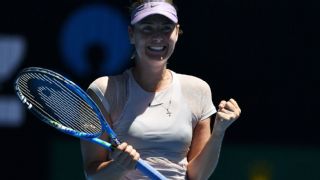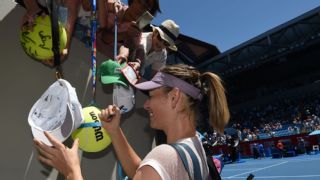|
MELBOURNE, Australia -- After waving to the crowd in appreciation of the warm greeting she received during her easy opening-round win at the Australian Open, Maria Sharapova quickly made her way from center court to the west edge of Margaret Court Arena. There, straddling the rail, were fans holding Russian flags who chanted encouragement to "Masha" from their third-row seat for the entire match. Then came an exchange of gifts: Sharapova tossed them her damp, match-used towel; one of the guys in the group extended a selfie-stick and requested they all strike a pose. As Sharapova snapped away, the crowd roared. Nearly two years after being banned for using meldonium during the 2016 Australian Open, Sharapova had a triumphant return with her 6-1, 6-4 straight-sets win over Tatjana Maria of Germany. The overall greeting she received from the moment she walked on the court for her morning match here in Melbourne: extremely heartfelt. Just as it was in April 2017 at the WTA event in Stuttgart, Germany, where she was welcomed in her first tournament back after serving a 15-month suspension. And just as it was at the US Open last August, where she was applauded loudly while winning her opening-round match against No. 2 seed Simona Halep in three sets. "I feel like the reception has been really warm throughout all the tournaments," Sharapova said. "The crowd and the fans and all the different cities that I have competed in have been great." Which begs the question: Why does Sharapova get a pass, while athletes in other sports don't? Lance Armstrong's reputation is forever tarnished after long-term doping offenses were uncovered in 2012, nullifying his seven Tour de France wins. Mark McGwire will probably never get a ceremony in Cooperstown after admitting in 2010 that he had taken steroids for more than a decade. Players such as Barry Bonds, Roger Clemens and Sammy Sosa have had their reputations permanently corroded for suspicion of using PEDs. Just last weekend, Chicago Cubs owner Tom Ricketts said that Sosa would need to "put everything on the table" in regard to his connection to PEDs if he wants to be welcomed back to the team.  Don't expect Sosa to budge. He knows an admission won't earn him anything more than a job with the Cubs. But getting ahead of the story has worked wonders for Sharapova, who announced her positive drug test at a big reveal news conference 22 months ago in Los Angeles. "I failed a drug test at the Australian Open," Sharapova said at the time. "I take full responsibility for it." Sharapova claimed the drug she took for 10 years wasn't used as a PED, even though emails cited in the International Tennis Federation's 33-page report showed her doctor urged her to increase her dosage during "games of special importance." That's a huge contradiction. Here's what helped Sharapova: She didn't play a dirty sport dominated by suddenly muscle-bound athletes who were shattering record books. She was a very good tennis player, but she didn't abruptly dominate the spot. And tennis fans bought her word over an IFT document that countered her denial. "She was taking what she thought was something that was going to help her health, so there's a fine line," said one fan, Johnny Rocka of Melbourne, who was watching the big-screen simulcast of Novak Djokovic beating Donald Young in a section of the Australian Open grounds known as the Melbourne Beach Club. "When you cheat, you take something knowing that you have to be better than someone else. She was already great." Jen Grant, who was sipping beer from a plastic cup while also taking in the Djokovic match from a bench, said Sharapova should be welcomed in her return.  "I actually don't like her as a player, because I think all that grunting is bad sportsmanship, but she served her ban, so let it be done," said Grant, also a Melbourne resident. "Will the drugs hang over her head a little? I think it will. But she's entertaining to watch, and she's a good player, and that's all that counts to tennis fans." That's all Sharapova seems to want from fans in her return -- a clean slate. While she came into this tournament unseeded and ranked No. 48 in the world, her chances improved greatly with the American contingent of Venus Williams, Sloane Stephens and CoCo Vandeweghe making early departures out of Melbourne after their losses. "I know that I face difficulties and challenges on the court, and that I start from no ranking and that I might start on some outside courts," Sharapova said. "I learned what it feels like to be on the ground and seeing life from the ground." Sharapova continues to face daggers. Canadian Eugenie Bouchard said last year that Sharapova is "a cheater, and so to me, I don't think a cheater in any sport should be allowed to play that sport again." Caroline Wozniacki, a former world No. 1, grumbled at last year's US Open about playing on outside courts late into the night while Sharapova was featured at Arthur Ashe Stadium. "Someone who has fought her way back from injury and is five in the world should play on a bigger court than Court No. 5," Wozniacki complained. And just last week, there were some darts thrown from the media after Sharapova appeared at the Australian Open tournament draw ceremony. Asked about her critics after her first-round win, Sharapova said simply, "I don't have anything to say to that." Sharapova did want to discuss how happy she was to return to the tournament after a year's absence. "It felt pretty routine. Just really happy to be back here." The fans were, clearly, happy to have her. During one quiet moment, a fan shouted loudly, "Maria, we missed you." Sharapova turned her head slightly and offered a little smile. As Sharapova mugged for the camera with her Russian fans after the match, it was clear that two years after being caught dirty here in Melbourne, she was enjoying being showered with appreciation during her career resurgence. For that, Sharapova should count her blessings. Especially considering what other athletes have faced in similar circumstances.
|
